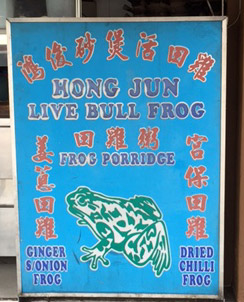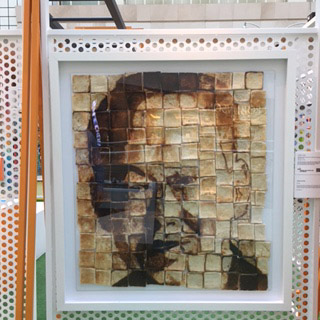 Travel broadens the mind and certainly educates the palate. Seeking a light snack for lunch whilst walking through the back streets of Singapore was an education in itself. I gave the frog porridge a miss but thoroughly enjoyed laksa, a dish of lobster, noodle, prawn, eggs and cockles cooked in a spicy coconut broth, even if it did test my chopstick skills to destruction.
Travel broadens the mind and certainly educates the palate. Seeking a light snack for lunch whilst walking through the back streets of Singapore was an education in itself. I gave the frog porridge a miss but thoroughly enjoyed laksa, a dish of lobster, noodle, prawn, eggs and cockles cooked in a spicy coconut broth, even if it did test my chopstick skills to destruction.
Food was a bit of a theme this trip. With a mix of cultures there’s a wide range of cuisine available at all times of day and night. Foodstuffs were even evident in the primary schools’ art exhibition we visited, and in a very creative way. The theme was ’Singapore, past present and future’. Interpretations included applications of traditional crafts such as silk batik, intricate Perankan beading and colourful pottery.
 But the installation that caught our attention was a play on the word ‘toast’. The ‘toast’ of Singapore is the first Prime Minister, Lee Kuan Yew, whose death earlier this year provoked a national outpouring of grief and gratitude, and whose face the pupils decided to portray using bread. The result was extraordinary, as you can see, but so also was the commentary on their process. Their initial ideas involved stencils, ovens and blowtorches, no combination of which produced a crisp enough image. Eventually, after many unsatisfactory attempts, they settled on grilling the different pieces to different degrees and scraping off the unwanted charcoal! A nice combination of art and science.
But the installation that caught our attention was a play on the word ‘toast’. The ‘toast’ of Singapore is the first Prime Minister, Lee Kuan Yew, whose death earlier this year provoked a national outpouring of grief and gratitude, and whose face the pupils decided to portray using bread. The result was extraordinary, as you can see, but so also was the commentary on their process. Their initial ideas involved stencils, ovens and blowtorches, no combination of which produced a crisp enough image. Eventually, after many unsatisfactory attempts, they settled on grilling the different pieces to different degrees and scraping off the unwanted charcoal! A nice combination of art and science.
Lee Kuan Yew had very definite views on education. His vision took Singapore to the top of the international education league tables. STEM, and maths education in particular, is acknowledged to be essential to the prosperity of the nation, as human capital is the only ‘home grown’ resource.
Singapore policy makers are continually looking for ways to improve maths education. Their planning is long term and coordinated. Their ‘teach less, learn more’ initiative, which focuses on the quality of learning, is intended to redress the balance between the heavy focus on the transmission of knowledge and high stakes assessments on the one hand, and on the other, the critical thinking, creativity and adaptability necessary to prepare young people for the complex demands of globalisation and the 21st century. Which is of course what we’re trying to do in the UK. Except sometimes it feels as though we're making a bit of a meal of it.
Lynne McClure
Director, Cambridge Mathematics